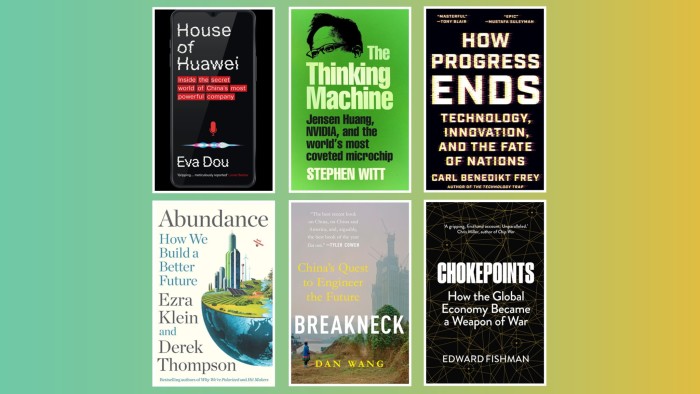Unlock the Editor’s Digest for free
Roula Khalaf, Editor of the FT, selects her favourite stories in this weekly newsletter.
Six books tackling the key business challenges of US-China competition, the impact of sanctions, the foundations of artificial intelligence and the pursuit of prosperity have reached the final of this year’s Financial Times and Schroders Business Book of the Year Award.
FT editor Roula Khalaf said the longlist of 16 was “one of the best” she had seen in her time as chair of judges, adding: “It was hard to pick out six finalists from such a strong field. It will be even tougher selecting a winner from among these great books.”
She announced the shortlist at a ceremony on Wednesday at fund manager Schroders’ US office in New York. The finalists are:
House of Huawei: Inside the Secret World of China’s Most Powerful Company, by Eva Dou, which investigates the rise of the Chinese technology company and the contribution of its founder, Ren Zhengfei, and the Chinese state.
Chokepoints: How the Global Economy Became a Weapon of War, by Edward Fishman, which addresses the use of sanctions, and analyses how an economic arsenal was developed, and the consequences for 21st century business, politics and economics.
How Progress Ends: Technology, Innovation, and the Fate of Nations, by Carl Benedikt Frey, looks at the interconnection of innovation and bureaucracy in determining the destiny of civilisations and institutions and what that means for the US, China and Europe today.
Abundance: How We Build a Better Future, by Ezra Klein and Derek Thompson, analyses the growth dilemma facing the US and the political trade-offs between regulation, investment, government support and innovation.
Breakneck: China’s Quest to Engineer the Future, by Dan Wang, examines the core differences between the US, a “lawyerly state”, and its arch-rival China, an “engineering state” that empowers innovation and ambition.
The Thinking Machine: Jensen Huang, Nvidia, and the World’s Most Coveted Microchip, by Stephen Witt, looks into the leadership style of the chipmaker’s chief executive and how he helped Nvidia become one of the world’s most valuable companies.
This year’s award is the 21st edition of the prestigious FT prize and is worth £30,000 to the author or authors of the winning book. It is the first for 15 years in which a novel made the longlist. The judges welcomed the inclusion of fiction but did not select Drayton and Mackenzie, by Alexander Starritt, for the shortlist.
The prize, which is also supported by FT owner Nikkei, will be presented in London on December 3. Authors of each of the shortlisted books will receive £10,000.
Last year’s prize was won by Parmy Olson’s Supremacy, about the rivalry between pioneers of artificial intelligence, and the 2023 winner was Amy Edmondson’s Right Kind of Wrong, about how to learn from failure and take better risks.
For more about the book award, visit www.ft.com/bookaward
